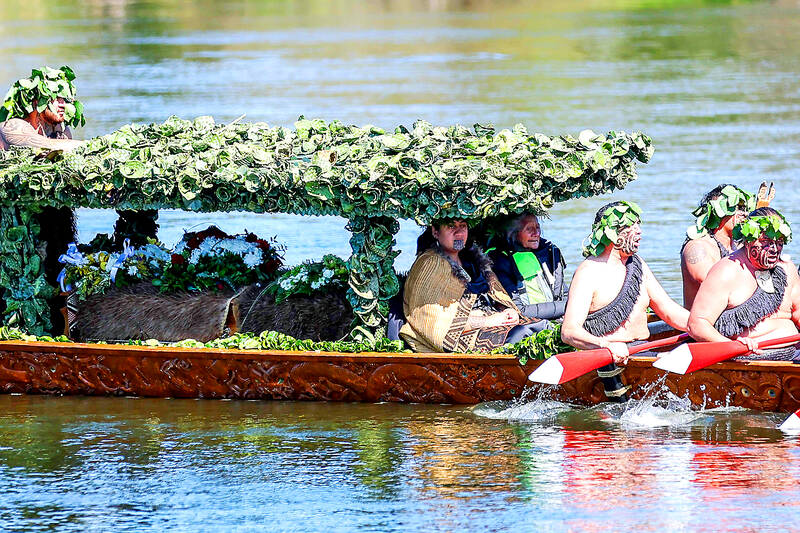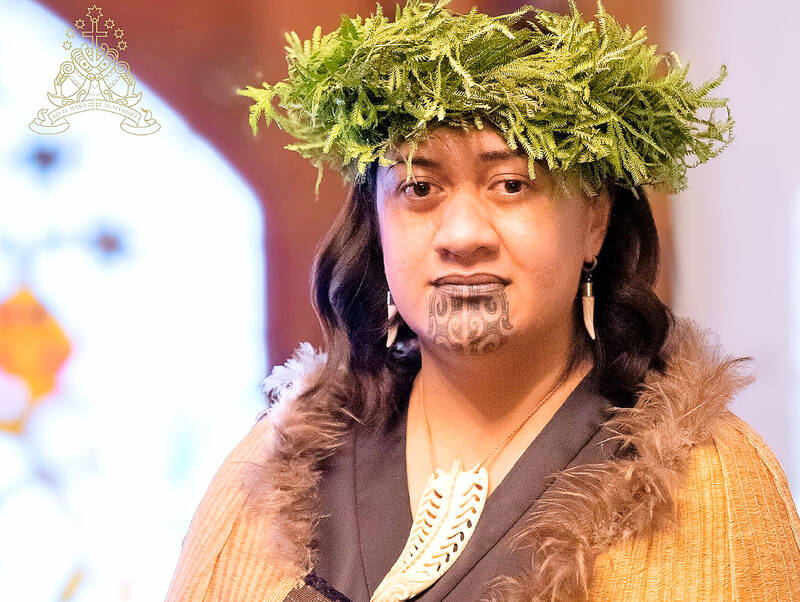New Zealand’s Maori chiefs yesterday anointed a 27-year-old queen as their new monarch, a surprise choice hailed as a symbol of change for the country’s indigenous community.
Nga Wai hono i te po Paki was cheered by thousands as she ascended a high-backed wooden throne during an elaborate ceremony in Ngaruawahia.
She is the youngest daughter of King Tuheitia Pootatau Te Wherowhero VII, who died on Friday last week after heart surgery.

Photo: AFP
After being elected by a council of chiefs, Nga Wai was ushered to the throne by a phalanx of bare-chested and tattooed men bearing ceremonial weapons who chanted, screamed and shouted in acclamation.
The queen, wearing a wreath of leaves, a cloak and a whalebone necklace, sat beside her father’s coffin as emotive rites, prayers and chants were performed. After six days laid in state, the late king was carried down the Waikato River as part of a flotilla of four war canoes, each powered by more than a dozen rowers.
His funerary procession passed throngs of onlookers camped on the riverbanks, before stopping at the foot of Mount Taupiri.

Photo: AFP / Kiingitanga
From there, three rugby union teams acted as pallbearers, shepherding his coffin up steep slopes to the summit and the final resting place of Maori royals.
The Maori monarch is a mostly ceremonial role with no legal status, but it has enormous cultural and sometimes political significance as a potent symbol of identity and kinship.
As the king’s only daughter and his youngest child, Queen Nga Wai was considered an outside choice to become his successor.
One of her two elder brothers had taken on many ceremonial duties during their father’s periods of ill health and had been widely tipped to take over.
Queen Nga Wai is the eighth Maori monarch and the second queen. Her grandmother, Queen Te Arikinui Dame Te Atairangikaahu, held the position for four decades until 2006.
“It is certainly a break from traditional Maori leadership appointments which tend to succeed to the eldest child, usually a male,” Maori cultural adviser Karaitiana Taiuru told reporters.
Taiuru said it was a “privilege” to witness a young Maori woman become queen, particularly given the ageing leadership and mounting challenges faced by the community.
“The Maori world has been yearning for younger leadership to guide us in the new world of AI [artificial intelligence], genetic modification, global warming and in a time of many other social changes that question and threaten us and indigenous peoples of New Zealand,” he said. “These challenges require a new and younger generation to lead us.”
The kiingitanga, or Maori king movement, was founded in 1858 to unite New Zealand’s tribes and provide a single counterpart to the colonial ruler, Britain’s Queen Victoria.
“People think Maori people are one nation — we’re not. We’re many tribes, many iwi. We have different ways of speaking out,” said Joanne Teina, who traveled from Auckland for the ceremony. “The kiingitanga was created to create unity — among people who were fighting each other for thousands of years, before pakeha [Europeans] came along.”

Kehinde Sanni spends his days smoothing out dents and repainting scratched bumpers in a modest autobody shop in Lagos. He has never left Nigeria, yet he speaks glowingly of Burkina Faso military leader Ibrahim Traore. “Nigeria needs someone like Ibrahim Traore of Burkina Faso. He is doing well for his country,” Sanni said. His admiration is shaped by a steady stream of viral videos, memes and social media posts — many misleading or outright false — portraying Traore as a fearless reformer who defied Western powers and reclaimed his country’s dignity. The Burkinabe strongman swept into power following a coup in September 2022

‘FRAGMENTING’: British politics have for a long time been dominated by the Labor Party and the Tories, but polls suggest that Reform now poses a significant challenge Hard-right upstarts Reform UK snatched a parliamentary seat from British Prime Minister Keir Starmer’s Labor Party yesterday in local elections that dealt a blow to the UK’s two establishment parties. Reform, led by anti-immigrant firebrand Nigel Farage, won the by-election in Runcorn and Helsby in northwest England by just six votes, as it picked up gains in other localities, including one mayoralty. The group’s strong showing continues momentum it built up at last year’s general election and appears to confirm a trend that the UK is entering an era of multi-party politics. “For the movement, for the party it’s a very, very big

A new online voting system aimed at boosting turnout among the Philippines’ millions of overseas workers ahead of Monday’s mid-term elections has been marked by confusion and fears of disenfranchisement. Thousands of overseas Filipino workers have already cast their ballots in the race dominated by a bitter feud between President Ferdinand Marcos Jr and his impeached vice president, Sara Duterte. While official turnout figures are not yet publicly available, data from the Philippine Commission on Elections (COMELEC) showed that at least 134,000 of the 1.22 million registered overseas voters have signed up for the new online system, which opened on April 13. However,

ENTERTAINMENT: Rio officials have a history of organizing massive concerts on Copacabana Beach, with Madonna’s show drawing about 1.6 million fans last year Lady Gaga on Saturday night gave a free concert in front of 2 million fans who poured onto Copacabana Beach in Rio de Janeiro for the biggest show of her career. “Tonight, we’re making history... Thank you for making history with me,” Lady Gaga told a screaming crowd. The Mother Monster, as she is known, started the show at about 10:10pm local time with her 2011 song Bloody Mary. Cries of joy rose from the tightly packed fans who sang and danced shoulder-to-shoulder on the vast stretch of sand. Concert organizers said 2.1 million people attended the show. Lady Gaga